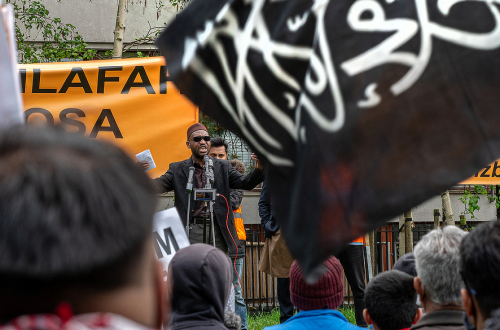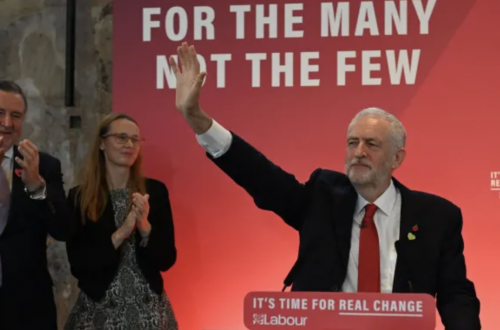Last night’s Channel 4 News report by Assed Baig on British Muslim alienation was full of non sequiturs and unprobed assertions. One interviewee complained:
What’s wrong with being radical? The Labour Party was a radical party? (0:32)
Yes, the word ‘radical’ can be applied to a range of views and movements, some of which we might find sympathetic. But what, if anything, implied by the term ‘radical Islam’ did this man consider positive or acceptable? What term would he prefer? Islamist?
As usual, Baig overeggs the issue.
I’m Assed Baig and I’ve reported on conflicts all over the world. But on my return I’ve been surprised to see the barricades have gone up here too. (35)
Mrs Elton in Emma claimed to find ‘something direful in the sound’ of Birmingham, but Small Heath is not exactly in the same league as CAR and Burma, two of the places Baig has recently reported from.
Less hyperbolic is his assertion that this is a time of unprecedented scrutiny of Muslims in the UK. But he goes on to gloss this in a rather odd way:
There’ve been allegations of radicalisation in schools and the lure for young people to fight in Syria. (0:50)
It’s time for Baig to face up to the fact that these were more than ‘allegations’ – and by making ‘lure’ mirror ‘allegations’ in that sentence there’s a half implication that it’s the British establishment which is doing the luring.
He then goes to a gym, where, we are told, people have been fighting off notions of extremism for years. But it is not at all clear what we are meant to make of the rather incoherently assembled points made by his first interviewee:
Muslims are growing into the community a lot more than they used to do. For example, groups that were on the fringe, Muslim groups, are now increasing their memberships simply because the mainstream Muslims don’t speak about it because they’re too scared of being labelled as being radical or being labelled as being terrorist supporters or sympathisers. (1.27)
What exactly are Muslims not allowed to say without being labelled extremists? That’s never explained satisfactorily. One interviewee suggests that being against a policy of bombing innocent people might be enough to identify him as a radical. But, leaving aside the tendentious wording, opposition to Western foreign policy is pretty mainstream. Some seemed aggrieved that they could offer no practical support for the suffering people of Syria. But, while their own intentions may be good, there’s been a clear trend for Britons who want to intervene in Syria joining groups such as Jabhat al-Nusra, ISIS, or other al-Qaeda linked factions.
After a brief and reasonable discussion about the way honour taboos make it more difficult for Asian girls to talk about sexual abuse (leading to an increased perception that only white girls were targeted) Baig talks to a group of women in Sparkhill about their experiences. They were exercised by a hostile media as well as foreign policy, both of which they find alienating. Afroze Zaldi Jivraj referred to being battered by media campaigns, a point echoed by Malia Bouattia, who claimed there is ‘a lot of apologism’ (4:35), seeking to demonstrate to non-Muslims that ‘we are such a peaceful people’. Is this a dig at Sara Khan’s campaign in the Sun? Given the fact the media has sometimes been, as Baig says, ‘hostile’, given that Afroze Zaldi Jivraj herself was quoted at the very beginning of the programme saying ‘Every opportunity Muslims are made out to be the enemy.'(0:30), isn’t it actually quite a good thing that the tabloids are working with Muslims to push back against such negative stereotypes?
Finally Baig returns to the Trojan Horse issue:
Ofsted found evidence of an organised campaign to target certain schools but the guys here told me it’s a failure of the school system to teach young people the real Islamic values that was driving so many to join the fight in Syria.(5:37)
That seems to be based on this interviewee’s comments.
‘I think that’s more based on lack of education in Islam itself. If someone’s educated well in Islam they know that you shouldn’t go out to do extreme things or join in extreme groups like IS who are killing both innocent people, Muslims and non-Muslims, and killing someone for no reason is wrong.
I’ve highlighted that first ‘but’ because it’s typical of the evasiveness of the entire report. No one has claimed that those behind the Trojan Horse affair were recruiting sergeants for ISIS. The implication here (and it’s Baig’s, not his interviewee’s) is that if the schools had been allowed to get on with their Islamification in peace then young people would be able to resist the lure of the Islamic State. What Baig seems to forget is that it’s not in fact the job of the state school system to teach ‘real Islamic values’.


